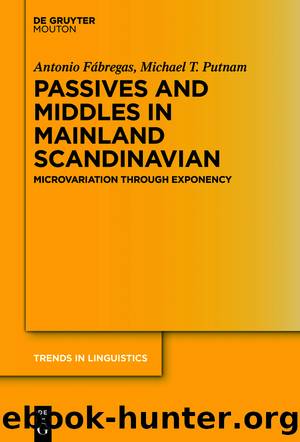Passives and Middles in Mainland Scandinavian by Antonio Fábregas Michael T. Putnam

Author:Antonio Fábregas, Michael T. Putnam
Language: eng
Format: epub
Publisher: De Gruyter
Published: 2020-02-25T07:31:13.555000+00:00
In what has been described as âactiveâ voice, the element that moves to the specifier of VoiceP is the highest argument, the agent. This had, as we saw, two effects: first, by extracting the DP agent from KP, it converts K into a constituent to the exclusion of DP, allowing its spell out with the verbal projections. Second, by defining the agent as a figure, it highlights it as the prominent member of the event, against any other participant or sub-event.
The periphrastic âpassiveâ, in contrast, is the situation where the element that moves to spec, Voice is not the agent DP. In the case of the bli-passive, there is no choice with respect to which element will move: once AspP is merged between vP and VP, it will have to move to the specifier of VoiceP for interpretability reasons.
Which ones? Remember that we are treating AspP as a projection that defines external aspect, that is, the viewpoint of the proposition. This head is therefore distinct from the projections that define lexical aspect or Aktionsart, which are vP and VP with their different semantic entailments about dynamicity, change, telicity, etc. We assume, standardly, that External aspect in AspP introduces a reference time (Klein 1994) that has to be ordered with respect to both the Utterance time introduced by TP and the eventuality time introduced by the lexical verb. Both Wiltschko (2014) and Ramchand (2008) emphasise that external aspect does not belong within the verbal domain, because it defines a viewpoint that is built on the temporal properties of the Davidsonian event defined at the vP-level. Material contained within vP, in Wiltschko (2014) and Ramchand (2008), introduces eventuality descriptions related to argument structure and Aktionsart. For this reason, a head that refers to the viewpoint and is not related to Aktionsart or argument structure cannot be contained in the material that gets interpreted within the verbal complex headed by vP, when transfer to LF takes place.
Moving AspP to the specifier of VoiceP places it at the edge of the highest head within the verbal complex, asymmetrically c-commanding the whole vP and therefore being placed above the material used to describe the eventuality. In the same way that the specifier of VoiceP extracts an agent from the vP and allows it to interact with TP becoming the subject of the clause, moving AspP to that specifier position removes it from within the domain of eventuality descriptions and lets it interact with the domain where it can be interpreted, the viewpoint entailments of the clause. The following diagram represents the relevant configuration.
(79)
Download
This site does not store any files on its server. We only index and link to content provided by other sites. Please contact the content providers to delete copyright contents if any and email us, we'll remove relevant links or contents immediately.
Cecilia; Or, Memoirs of an Heiress — Volume 1 by Fanny Burney(32547)
Cecilia; Or, Memoirs of an Heiress — Volume 2 by Fanny Burney(31945)
Cecilia; Or, Memoirs of an Heiress — Volume 3 by Fanny Burney(31931)
The Lost Art of Listening by Michael P. Nichols(7494)
Asking the Right Questions: A Guide to Critical Thinking by M. Neil Browne & Stuart M. Keeley(5759)
We Need to Talk by Celeste Headlee(5608)
On Writing A Memoir of the Craft by Stephen King(4935)
Dialogue by Robert McKee(4389)
Pre-Suasion: A Revolutionary Way to Influence and Persuade by Robert Cialdini(4224)
I Have Something to Say: Mastering the Art of Public Speaking in an Age of Disconnection by John Bowe(3872)
Elements of Style 2017 by Richard De A'Morelli(3341)
The Book of Human Emotions by Tiffany Watt Smith(3303)
Fluent Forever: How to Learn Any Language Fast and Never Forget It by Gabriel Wyner(3079)
Name Book, The: Over 10,000 Names--Their Meanings, Origins, and Spiritual Significance by Astoria Dorothy(2979)
Why I Write by George Orwell(2945)
Good Humor, Bad Taste: A Sociology of the Joke by Kuipers Giselinde(2944)
The Art Of Deception by Kevin Mitnick(2796)
The Grammaring Guide to English Grammar with Exercises by Péter Simon(2740)
Ancient Worlds by Michael Scott(2682)
